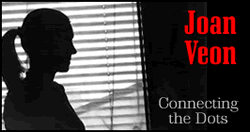Other
Veon
Articles:
US Leaders Highlight World Economic Forum Agenda
Global Taxation And Tax Harmonization
Does The
Global Economy Need a Global Currency?
THE UNITED NATIONS FOSTERS A �UN OF CORPORATIONS�
By
Joan Veon
July 23, 2004
NewsWithViews.com
Ten years ago I found a diagram entitled �New Models of Governance� that showed what the governmental structure of the UN would look like at some future point in time. The book, The Gaia Peace Atlas, was published in 1988. The diagram revealed plans to add a second chamber or �International House of Representatives� to the current single chamber of the UN, the General Assembly. Furthermore, the following groups would be connected to the International House of Representatives and have decision-making power: Non-Governmental Organizations, Transnational Corporations, United Nation�s Agencies, Professional Bodies and Financial Bodies.
To understand what transpired several weeks ago, some background is needed. In 2000, the kings, princes, presidents and prime ministers of this world went to the UN Millennium Summit in New York and gave the UN numerous powers which include: strengthening the power of the Secretary-General, strengthening the power and authority of the General Assembly, adding a �rapid deployment force� to keep peace in the world, allowing the UN to find ways to levy taxes so they would not be dependent on the dues from member nation-states, and adding the second chamber for the people of the world to be represented directly at the UN.
Furthermore, they adopted a number of �development goals� which include reducing poverty and hunger by 50% by 2015, ensuring that all boys and girls complete primary school, reduce by 66% child mortality among children under five years old, reduce by 75% the women dying in childbirth, halt and begin to reverse the spread of HIV/AIDS, malaria and other major diseases, integrate principles of sustainable development into country policies which includes improving the lives of at least 100 million slum dwellers and open trading and financial systems that include a commitment to good governance, development and poverty reduction.
Recently at the Group of Eight meeting in Sea Island, Georgia, the heads of state authorized a �peacekeeping force� of 75,000 troops for Africa that can be deployed anywhere in the world, thus making it a �rapid deployment force�. Furthermore, French President Jacques Chirac put on the agenda, �taxation for the poor� which really constitutes global taxation. By the fall, a group comprised of the French and British will come up with new global tax schemes.
At the UN several weeks ago, it appears that part of the 1988 diagram; a �UN of Corporations� is being put in place. Under the aegis of the �UN Global Compact� which has 1500 corporate members, about one third or 480 CEO�s met and discussed how they will proceed to incorporate the goals of the Compact in everyday activities. They were joined by key non-governmental organizations and financial organizations such as stock exchanges and mutual fund companies.
UN Secretary-General Kofi Annan first introduced the concept of the Global Compact in 1999 at the World Economic Forum in Davos, Switzerland. The concept then found its way into one of the Millennium Summit development goals in 2000 that called for the strengthening of the UN through governments working with businesses, NGO�s, and international UN agencies. The GC was then officially launched in 2001 at a high level meeting with these same actors which, interestingly enough, are the same actors as those diagrammed in the Gaia Peace Atlas.
According to the United Nations, in a globalized world, i.e., a world without borders which marginalizes the poor, that a new commitment to protect them is in order. On that note, most of the marginalized live in communistic or oppressive regimes that have facilitated their poverty or where the World Bank made loans to governments that impoverished and bankrupted the country when their financial schemes did not work. The Millennium Summit goals should be seen only as a transfer of wealth. It is the taxpayer in the developed countries of the north that will pay for utopian dreams that will never be met. This is socialism at its finest and now we have an even bigger problem for the multinational and transnational corporations have bought into transfer of wealth as a way to make profits and develop these poor countries!
The GC has its own philosophy that reflects the UN Charter and the Millennium Summit goals. It was referred to as having �universal principles� and drawing its �moral authority and global convening power from the UN Secretary General.� The GC also incorporates sustainable development and human rights. The goal basically is to restructure and reorganize society, government, and business. Think of the power of the corporation that has the ability to hire and fire and to make or break a person or country. Of the top 100 largest countries, 51 are transnational corporations! In an interview with Jane Nelson who is currently working with the John F. Kennedy School of Government and who is a director at the Prince of Wales International Business Leaders Forum, she explains the changing relationship between business and government,
It is not only where do we see business going, but where do we see government going as well. I think we need an ongoing dialogue as to the boundaries between what business should be doing and what governments and other sectors should be doing. In some answers, business is going to have to play a bigger role and in other issues, we will have to have government play a bigger role.
The partnership everyone is referring to is public-private partnership which is a merger between government and business. I remember asking John Ruggie, special adviser to Kofi Annan at the World Economic Forum in 2001 if the partnership between government and business was fascism. His facial expression changed as he told me everyone has a role to play and that the Global Compact was a microorganism of a new approach to global governance, i.e. world government. Mr. Ruggie wrote the Global Compact and is a member of the Royal Institute for International Affairs, the Council on Foreign Relations, and the Tri-Lateral Commission, groups advocating world government.
When I asked George Kell who heads up the Global Compact at the UN what kind of �ism� we were seeing, he explained, �The Secretary-General has often said that we are beyond outdated ideologies. We are trying to do something new. We are trying to bring together values shared by every person with the power of markets.� Let us remember that the U.S. has signed on to this and is the largest dues paying member of the United Nations!
Interestingly enough, we do not have businesses teaching the Constitution to their employees, yet at the Global Compact meeting it was suggested that it was now time for corporations to educate their employees with regards to the Millennium Development goals.
Already business is now reporting in their annual reports what they are doing to reduce poverty, how they are protecting the environment, and how they are respecting the human rights of others. Again, the UN Declaration on Human Rights is not based on the Constitution or the Bill of Rights. Now the UN is calling on business to incorporate these aspects into how they do business. Furthermore, there were recommendations that the Global Compact become like an �ISO� standard that means if you don�t sign on, you don�t do business.
What was one of the major outcomes of this meeting? First, I think it is important to mention that the closing session of the Global Compact Summit was in the General Assembly room that has significant meaning. Why would the UN allow the CEO�s to meet in the room where UN Ambassadors make decisions that constitute international law if this were not of the same ilk? I asked Georg Kell if what we were seeing here was a �UN of Transnational Corporations.� He replied, �That is a question of how you phrase it�we are an on-going experiment in cooperation. This is how we like to look at ourselves.�
Furthermore, Secretary-General
Kofi Annan said in his closing speech, �Our immediate task ahead is
to define the precise features of the Global Compact�s new strategic
concept, and to design a new governance structure that matches its
widening scope [T]he Compact [has the] potential to be a truly global
platform.� Stay tuned.
� 2004 Joan Veon - All Rights Reserved
Sign Up For Free E-Mail Alerts
E-Mails
are used strictly for NWVs alerts, not for sale
 Order
Joan Veon's book;
Order
Joan Veon's book;
"The
United Nations'
Global Straitjacket"
Joan Veon is a businesswoman and independent
international reporter. Please visit her website: www.womensgroup.org.
To get a copy of her WTO report, send $10.00 to The Women's International
Media Group, Inc. P. O. Box 77, Middletown, MD 21769. For an information
packet, please call 301-371-0541 E-Mail: jveon@adelphia.net
According to the United Nations, in a globalized world, i.e., a world without borders which marginalizes the poor, that a new commitment to protect them is in order. On that note, most of the marginalized live in communistic or oppressive regimes that have facilitated their poverty or where the World Bank made loans to governments that impoverished and bankrupted the country when their financial schemes did not work.








